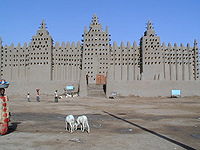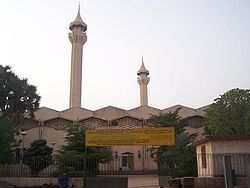
Islam in Mali
Encyclopedia

Mali
Mali , officially the Republic of Mali , is a landlocked country in Western Africa. Mali borders Algeria on the north, Niger on the east, Burkina Faso and the Côte d'Ivoire on the south, Guinea on the south-west, and Senegal and Mauritania on the west. Its size is just over 1,240,000 km² with...
, the largest country in West Africa
West Africa
West Africa or Western Africa is the westernmost region of the African continent. Geopolitically, the UN definition of Western Africa includes the following 16 countries and an area of approximately 5 million square km:-Flags of West Africa:...
. The majority of Muslims in Mali are Sunni.
History
During the 9th century, Muslim BerberBerber people
Berbers are the indigenous peoples of North Africa west of the Nile Valley. They are continuously distributed from the Atlantic to the Siwa oasis, in Egypt, and from the Mediterranean to the Niger River. Historically they spoke the Berber language or varieties of it, which together form a branch...
and Tuareg merchants brought Islam southward into West Africa. Islam also spread in the region by the founders of Sufi brotherhoods (tariqah
Tariqah
A tariqa is an Islamic religious order. In Sufism one starts with Islamic law, the exoteric or mundane practice of Islam and then is initiated onto the mystical path of a tariqa. Through spiritual practices and guidance of a tariqa the aspirant seeks ḥaqīqah - ultimate truth.-Meaning:A tariqa is a...
). Conversion to Islam linked the West African savannah through belief in one God and similar new forms of political, social and artistic accoutrements. Cities including Timbuktu
Timbuktu
Timbuktu , formerly also spelled Timbuctoo, is a town in the West African nation of Mali situated north of the River Niger on the southern edge of the Sahara Desert. The town is the capital of the Timbuktu Region, one of the eight administrative regions of Mali...
, Gao
Gao
Gao is a town in eastern Mali on the River Niger lying ESE of Timbuktu. Situated on the left bank of the river at the junction with the Tilemsi valley, it is the capital of the Gao Region and had a population of 86,663 in 2009....
and Kano
Kano
Kano is a city in Nigeria and the capital of Kano State in Northern Nigeria. Its metropolitan population is the second largest in Nigeria after Lagos. The Kano Urban area covers 137 sq.km and comprises six Local Government Area - Kano Municipal, Fagge, Dala, Gwale, Tarauni and Nassarawa - with a...
soon became international centers of Islamic learning.
The most significant of the Mali kings was Mansa Musa
Mansa Musa
Musa I , commonly referred to as Mansa Musa, was the tenth mansa, which translates as "king of kings" or "emperor", of the Malian Empire...
(1312–1337) who expanded Mali influence over the large Niger city-states of Timbuktu
Timbuktu
Timbuktu , formerly also spelled Timbuctoo, is a town in the West African nation of Mali situated north of the River Niger on the southern edge of the Sahara Desert. The town is the capital of the Timbuktu Region, one of the eight administrative regions of Mali...
, Gao
Gao
Gao is a town in eastern Mali on the River Niger lying ESE of Timbuktu. Situated on the left bank of the river at the junction with the Tilemsi valley, it is the capital of the Gao Region and had a population of 86,663 in 2009....
, and Djenné
Djenné
Djenné is an Urban Commune and town in the Inland Niger Delta region of central Mali. In the 2009 census the commune had a population of 32,944. Administratively it is part of the Mopti Region....
. Mansa Musa was a devout Muslim who was reported to have built various major mosques throughout the Mali sphere of influence; his gold-laden pilgrimage to Mecca made him a well known figure even in European history writing. It was under Mansa Musa that Timbuktu
Timbuktu
Timbuktu , formerly also spelled Timbuctoo, is a town in the West African nation of Mali situated north of the River Niger on the southern edge of the Sahara Desert. The town is the capital of the Timbuktu Region, one of the eight administrative regions of Mali...
became one of Africa's and the world's major cultural centers.
Muslims in Mali
Islam as practiced in the country is reported to be relatively tolerant and adapted to local conditions. Women participate in economic and political activity, engage in social interaction, and generally do not wear veils. Islam in Mali has absorbed mystical elements, ancestor veneration and the traditional animist beliefs that still thrive. Many aspects of Malian traditional society encourage norms consistent with democratic citizenship, including tolerance, trust, pluralism, the separation of powers and the accountability of the leader to the governed.Relations between the Muslim majority and the Christian and other religious minorities—including practitioners of traditional indigenous religions are reportd to be generally stable, although there has been a few cases of instability and tension in the past. It is relatively common to find adherents of a variety of faiths within the same family. Many followers of one religion usually attend religious ceremonies of other religions, especially weddings, baptisms, and funerals.
There are foreign Islamic preachers that operate in the north of the country, while mosques associated with Dawa (an Islamist group) are located in Kidal, Mopti
Mopti
Mopti is a city at the confluence of the Niger and the Bani in Mali, between Timbuktu and Ségou. The city lies on three islands linked by dykes: the New Town, the Old Town and Medina Coura. As a result it is sometimes known as the "Venice of Mali".-History:The city of Mopti derives its name from...
, and Bamako
Bamako
Bamako is the capital of Mali and its largest city with a population of 1.8 million . Currently, it is estimated to be the fastest growing city in Africa and sixth fastest in the world...
. The organization Dawa has gained adherents among the Bellah
Bellah
Bellah is a surname, and may refer to:* James Warner Bellah , pulp fiction writer* Robert N. Bellah , American sociologist...
, who were once the slaves of the Tuareg nobles, and also among unemployed youth. The interest these groups have in Dawa is based on a desire to dissociate themselves from their former masters, and to find a source of income for the youth. The Dawa sect has a strong influence in Kidal, while the Wahabi movement has been reported to been steadily growing in Timbuktu. The country's traditional approach to Islam is relatively moderate, as reflected in the ancient manuscripts from the former University of Timbuktu
University of Timbuktu
The University of Timbuktu was a medieval University in Mali, West Africa which comprised three schools; namely the Masajid of Djinguereber, the Masajid of Sidi Yahya, and the Masajid of Sankore. During its zenith, the university at Timbuktu had an average attendance of around 25,000 students...
.
In August 2003, a conflict erupted in the village of Yerere in Western Mali when traditional Sunni practitioners attacked Wahhabi Sunnis, who were building an authorized mosque.
Other foreign missionary groups are Christian groups that are based in Europe and engaged in development work, primarily the provision of health care and education.
Status of religious freedom

State religion
A state religion is a religious body or creed officially endorsed by the state...
as the constitution defines the country as a secular state and allows for religious practices that do not pose a threat to social stability and peace.
The government requires that all public associations, including religious associations, register with the government. However, registration confers no tax preference and no other legal benefits, and failure to register is not penalized in practice. Traditional indigenous religions are not required to register.
A number of foreign missionary groups operate in the country without government interference. Both Muslims and non-Muslims are allowed to convert people freely.
The family law, including laws pertaining to divorce, marriage, and inheritance, are based on a mixture of local tradition and Islamic law and practice.
During presidential elections held in April and May 2002, the Government and political parties emphasized the secularity of the state. A few days prior to the elections, a radical Islamic leader called on Muslims to vote for former Prime Minister Ibrahim Boubakar Keïta. The High Council of Islam, the most senior Islamic body in the country, severely criticized the statement and reminded all citizens to vote for the candidate of their choice.
In January 2002, the High Council was created to coordinate religious affairs for the entire Muslim community and standardize the quality of preaching in mosques. All Muslim groups in the country currently recognize its authority.

